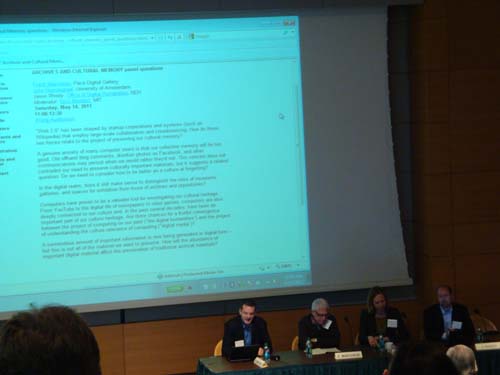Day 1: Forum 1
David Thorborn – Moderator: Emergence of technology are challenging our perceptions of art, academia, etc/ We are entering a disorienting future – mobile technology, understanding authors and the works they make is challenged by virtual technology. Profound forms of transformation created by technology. Edison envisioned ways for use of film before film appeared and this is instructive and comforting. There is a ceaseless transformation with rise and fall of technology that profoundly transform what is being transmitted. Printed book itself refined by generations and developed over decades of work and stability. Emergence of profoundly new ways and new systems for artistic and other forms of imaginative expression is remarkable in this world.
What’s the future impact on audiences and ways to communicate on unstable platforms.
The future of narrative. Public spheres. Visions and nightmares.
Klaus Peter Muller: Transition we are in is comparable to transition from middle ages to modern age – from agriculture to industry. How long it will last, no one knows. We know what we are leaving but not where we’re going to. We are in a period of enormous change and are experiencing an important transition with all its insecurities and instabilities of such a period. Narrative will survive for a very long time and there is no reason to fear there will be significant changes. But it will be interesting to see what the new medium will bring to narrative. What is happening to the culture of stories and story telling. New media go beyond that. What can these new platforms do best.
Kathleen Fitzpatrick: stories now move very fluidly from diff kinds of space in ways that print narrative is unable to provide. Novelists present text-based linear narratives that have dominated our culture. All those different forms of narrative happen in print but also in multiple format at once now in twitter, blogs etc. Story tellers have greater platforms to get their stuff out. It is great that they have access to those tools of production. Cutting out the middle man in distribution of narrative is great. But if we lose middleman entirely then every author might have to be a self-marketer. We can move narrative out of the cathedral into the bazaar – does it do it good? In all of this thinking we’re at an incubation period and we’re so early in dealing with text in very unstable platforms.
Mark Leccese: What’s the future impact on audiences and ways to communicate on unstable platforms. : I don’t think narrative is changing. Platforms change more slowly. Persistence of legacy platforms are overlooked. How many read text in a printed page? Book sales not ebooks increased by 3.6%. The stories remain the same. The only distinction is good narrative and less good narrative. As we move around in all the platforms we have and all the access we have … There is a constant stream of narrative and we find important and excellent narrative.
Joshua Banton: stories are changing – and formats have significant impact on narrative. They are less contained. We can update stories and they can morph over time. The story is delivered in NYT and will be added to -as ancillary objects from maybe twitter that links to it and then adds a comment to it. Narratives unravel itself slowly.
Definition of who is a journalist. There are people who will create journalism without labeling themselves journalists. They’re not always unstablized as ppl think but they still generate a lot of revenue. We’re starting to see how journalism works: how selective they are about what is the important story for example. Those patterns are being exposed as intelligent distillation of background facts but not necessarily the answer. We should look at the decline of geography. Our political structures are still geographically based.
Mark: what distinguishes journalism from other writings? Journalism is gathering info from primary sources rather than secondary ones. If someone in a sociology class assigned students to write a paper on a topic, sources and citation will be secondary sources. So who will be journalists of the digital age? We have all disseminated news. The skills of gathering and organizing information will distinguish journalism from others. Journalists will remain to gather, organize and communicate information and will be paid for it. They just need to adapt to unstable platforms. It is a problem of business model.
Thorborn: people might get too used to unstable platforms that they will not want to have stable ones.
Peter: who’s in control of this change? We have one social network – facebook – and one book seller which is amazon, and even though you can name others, they have dominance. This is one of the greatest dangers. But there is great potential in increasing democracy particularly in local communities.
Kathleen: optimism great potential for access to tools but ugly fact remains that there might not be a viable business model for publishing. If so, what then? We are not equipped to do something without a business plan. More ppl have more access, but there is a problem of persistence. How do we preserve them and what do we preserve and how do we keep them accessible.
Mark: demonstration of high demand for and interest in journalism and information. New platforms have created more interest in information and opinion across multiple platforms. 2: lowering of barrier of entry: localization of information and news. No need to pay now for typsetting and publishing costs. Growth of high targeting news outside mainstream media. But disturbing facts are: sometimes there is a race to abandon platforms that are very useful still. There is also an erosion of fact-checking. Also there is a fragmentation of audience and effect of that on public sphere.
